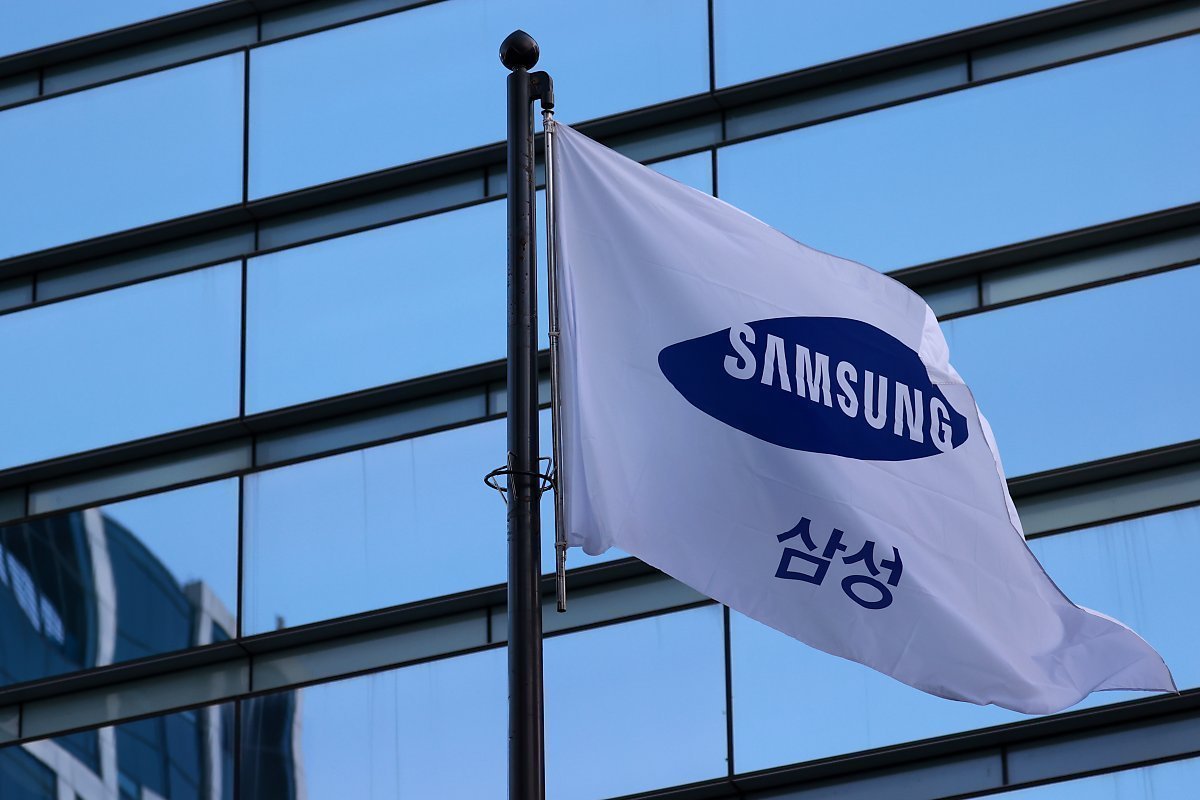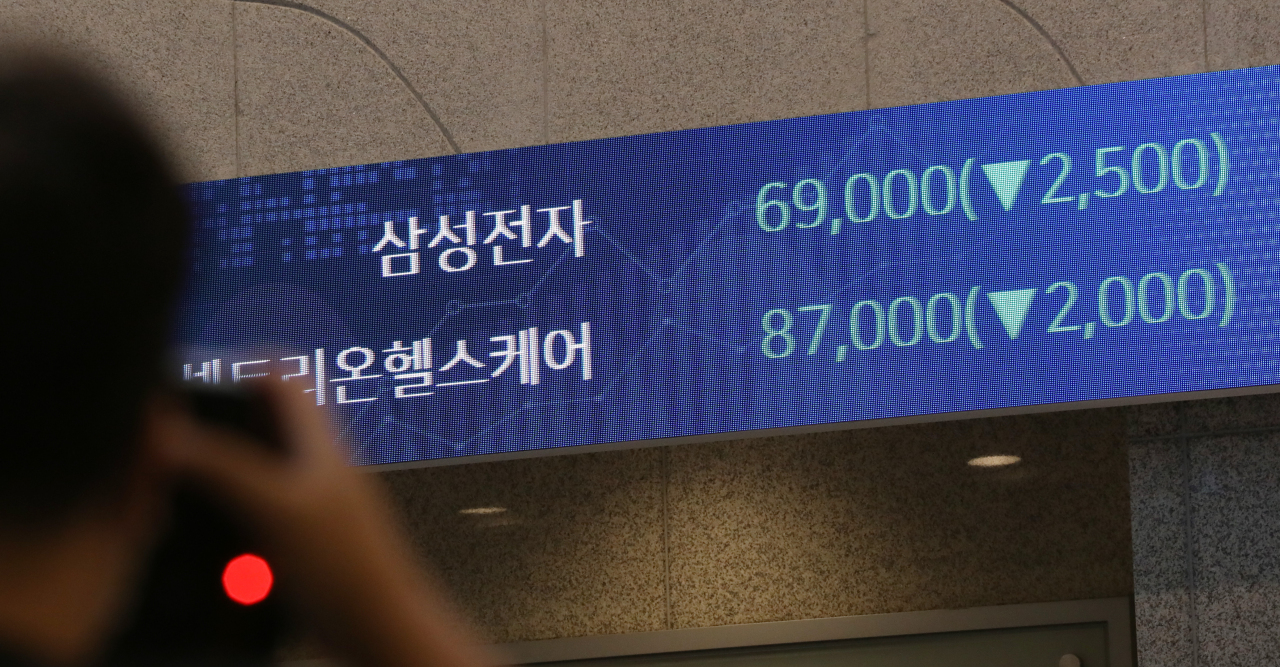 |
A flag bearing the corporate logo of Samsung Group waves in front of its office building in southern Seoul. (Yonhap) |
A 39-year-old investor in Seoul, surnamed Choi, had a strong belief that the share value of Samsung Electronics would soon reach 100,000 won ($84.80). Despite its continuous fall, recently to below 70,000 won, Choi has no plan to sell shares of the nation’s largest conglomerate and the world’s largest chipmaker. Instead, he sees the falling price as an investment opportunity.
“I believe in Samsung Electronics. Although it appeared to go into free fall from some 90,000 won-level marked earlier this year, I recently bought an additional 100 shares of Samsung Electronics,” he said. “The stock price will eventually rise in the future.”
Choi is one of millions of small domestic investors scooping up Samsung shares this year. From the beginning of this year to Tuesday, they purchased a net 34.9 trillion won worth of the shares, according to data compiled by the Korea Exchange.
Market insiders estimate the number of small shareholders in the nation’s largest company by market capitalization to exceed 6 million. Out of some 51.82 million Koreans, nearly 11.4 percent of them, or 4.55 million retail investors, held Samsung Electronics shares as of the end of June this year, according to its half-term report. It was more than a threefold increase from 1.45 million a year ago.
While individual investors scooped up the tech giant’s shares, the stock has shown a lackluster performance in recent months. The Samsung stock hit its yearly high closing of 91,000 won on Jan. 11 this year, but it plunged to a yearly low closing of 68,800 won on Wednesday. The share price inched up 0.57 percent to close at 70,600 won on Tuesday. Retail investors purchased the shares at 80,529 won on average this year, data showed.
Contrary to retail investors’ ardent wishes, Samsung Electronics has been the most shorted stock this year, with nearly 2.5 trillion won worth of shares traded in negative bets as of Tuesday.
 |
An electronic board at the Korea Exchange’s Seoul office shows Samsung Electronics shares slid 3.5 percent to close at 69,000 won ($58.50) on Oct. 12, the lowest level since Dec. 1, 2020. (Yonhap) |
Despite negative prospects in the chip industry and increased market volatility, retail investors remain “loyal,” as it means more than just a tech stock for retail investors, according to market observers.
Samsung shares are believed to be a relatively safe choice compared to other locally listed stocks. Retail investors strongly believe that the stock will maintain its top position in the domestic market. At the same time, they consider the blue-chip stock as better value than shares in overseas tech giants such as Alphabet, Amazon, Tencent Holdings and Apple, the experts said.
“Day traders have learned lessons from the past (especially during the pandemic-hit market) that Samsung Electronics stock would soar even after a sharp plunge. Although many brokerage houses have suggested a gloomy outlook on the chip industry, (retail) investors choose to buy the shares in hope of seeking decent profits,” a head of research at a local securities firm said on condition of anonymity.
Yonsei Unversity’s economics professor Yang Joon-mo also noted that Samsung Electronics has been a stock trusted by Korean investors for a long time. Investors who have seen the company’s growth over several decades have faith in the tech giant’s rosy outlook, he said. They also consider Samsung Electronics as a valuable stock since its dividend yields have been higher than bank deposit rates, the expert added.
Another expert said that day traders are attracted to Samsung Electronics because the prices of blue-chip stocks tend to surge in the long term. Yet the key to making profits is to “keep possessing” even during a volatile market, he said.
“(Whether it is true or not) just like a story of a Samsung shareholder, who earned big from investment and sent children to study abroad, if retail investors continuously buy and hold their blue-chip stocks, they will eventually obtain earnings. ... Samsung Electronics shares may plummet further but (small domestic) investors are recommended to hang in there.”
Meanwhile, major securities firms here have lowered their target prices of Samsung Electronics, forecasting the company will likely face external risk factors for a while. On top of a gloomy chip outlook backed by falling NAND flash and DRAM next year, heightening global uncertainties from US and China will lead foreign investors to increasingly prefer low-risk assets and sell the tech giant’s stock even more, they said.
“Samsung Electronics’ stock price adjustment will continue in the wake of uncertain demand for chips. The projection of a further NAND price fall has worsened (the product buyers’) sentiment,” said Park Yoo-ak, an analyst at Kiwoom Securities.
Lee Seung-woo, an analyst at Eugene Investment & Securities also suggested an uncertain outlook for the tech company’s corporate performance. Considering key factors, including the economic slowdown of China and US, the firm will show a stagnant performance at least until the first half of next year, the market watcher said.
By Jie Ye-eun (
yeeun@heraldcorp.com)






![[Herald Interview] 'Trump will use tariffs as first line of defense for American manufacturing'](http://res.heraldm.com/phpwas/restmb_idxmake.php?idx=644&simg=/content/image/2024/11/26/20241126050017_0.jpg)


